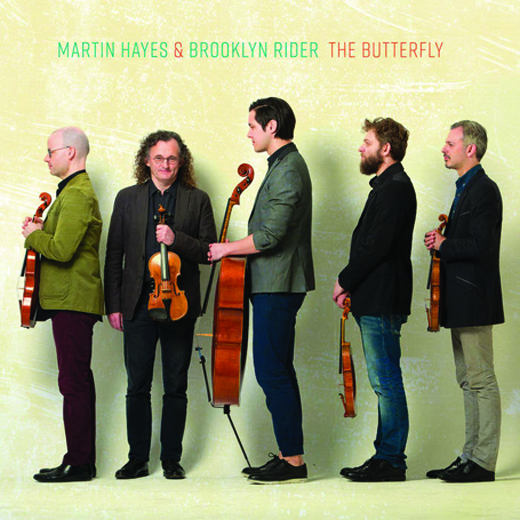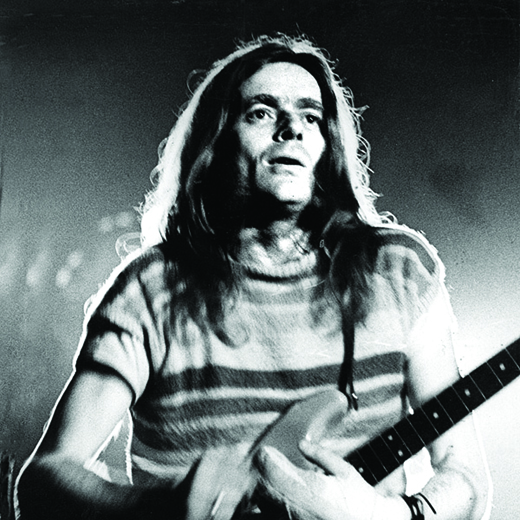On the 50th anniversary
of the
Woodstock
Music Festival, Christine Kinealy
remembers the legendary
guitarist from Northern
Ireland who gave a
celebrated
performance.
Jimi Hendrix, Janis Joplin, The Who, The Band, Creedence Clearwater Revival, Jefferson Airplane, Ten Years After, Joan Baez, Santana, Joe Cocker, Crosby, Stills, Nash, and Young, and – Henry McCullough. They all played at Woodstock in 1969. McCullough has the distinction of being, reputedly, the only Irishman to play in the festival.
For guitarist McCullough, it was literally a flying visit. He was helicoptered in, performed with Joe Cocker and the Grease Band, and then they all left to play at the next gig on their own tour of the United States.
McCullough was born in Portstewart in Co. Derry in 1943. He was part of a generation of people born in the north that also produced Seamus Deane, Seamus Heaney, Liam Neeson, Stephen Rea, Mary McAleese, Gerry Adams and George Best. It was also the generation that witnessed the onset of the “Troubles.” McCullough’s passion was music; he got his first guitar at age 17
and then joined a succession of bands – the Skyrockets, Gene and the Gents, the People, and Éire Apparent. The latter toured with Pink Floyd, the Jimi Hendrix Experience, and Amen Corner.
McCullough next joined the Grease Band, the backing band of Joe Cocker. It was while touring in the U.S. that the band appeared in Woodstock on August 17. The Grease Band played two opening pieces, then, with Cocker, they performed a further 11, which included Bob Dylan’s “Just Like a Woman” and the Beatles’ “With a Little Help from My Friends.” The latter song, which had already been a massive hit for Cocker, was to become the anthem for the Woodstock era.
But, in terms of payment, Joe Cocker and his supporting band were near the bottom of the spectrum. Headliner and undisputed Rock God, Jimi Hendrix was paid $18,000. Blood, Sweat and Tears came in second with $15,000. Cocker received only $1,375. Tragically, just over a year later, Hendrix was dead, the London coroner determining that he had aspirated from his own vomit and died of asphyxia while intoxicated with barbiturates.
In 1971, McCullough was recruited by former Beatle Paul McCartney to join Wings. It was a period of success for both, McCullough featuring with a guitar solo in the hit song “My Love.” It is thought that McCullough influenced McCartney to write a song in February 1972, protesting
against Bloody Sunday. It was called “Give Ireland Back to the Irish.” The single was banned by the BBC and even Radio Luxembourg (a non-regulated channel) refused to play it. Regardless of the censorship, “Give Ireland Back to the Irish” reached No. 16 in Britain, No. 21 in the U.S.,
and No. 1 in the Republic of Ireland and Spain.
McCullough left Wings in 1973, playing with a variety of leading artists and even forming his own Henry McCullough Band. By the 1980s, he had settled in Dublin, often playing with the Fleadh Cowboys. At the end of the decade, he again formed his own band and toured Ireland with them. During this period, he also penned several songs and released a number of albums,
which were all well received.
In 2012, McCullough had a major heart attack that left him debilitated. He died in June 2016 at his home in Antrim.
In a rare interview given in 2008, McCullough reflected on his life, “I’ve had a better life than most players, because it’s not every day you get to play with Paul McCartney. I saw Flower Power, ’69, the summer of this and that, and Woodstock. I remember 85 percent of it. Not many do.”

New Release by Martin Hayes
The celebrated Clare fiddle player, Martin Hayes, and the multi-faceted string quartet Brooklyn Rider, released “The Butterfly,” their much-anticipated collaboration in August. Siobhan Long writing in the Irish Times called it a “a masterclass in risk-taking and at the same time an unapologetic doffing of their collective caps to the seemingly simple tunes that form the backbone of most early traditional musicians’ repertoires.”
This new take on some of Ireland’s lesser known tunes is definitely one to add to your collection. ♦


Leave a Reply